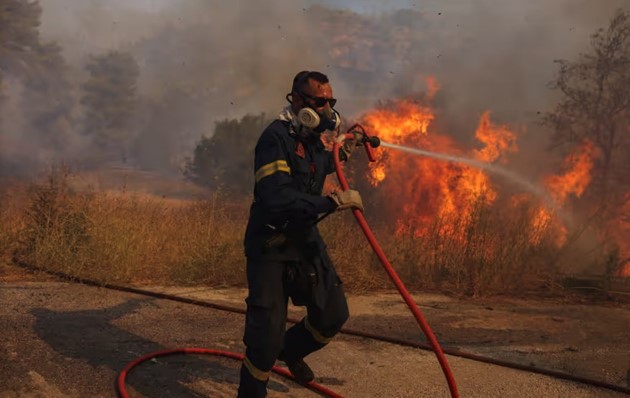
Study Reveals Carbon Pollution-Driven Heat Claimed 50,000 Lives in Europe Last Year
A recent study has revealed that heat exacerbated by carbon emissions claimed nearly 50,000 lives across Europe last year, as the continent experiences warming at a rate much faster than other regions of the world. The findings emerge as wildfires ravage areas near Athens, France issues extreme heat alerts for vast regions, and the UK endures what is anticipated to be the hottest day of the year according to the Met Office.
Heat is often termed a "silent killer" by medical professionals due to its lethal impact, which is often underestimated. The study, published in Nature Medicine, highlights that the death toll in 2023 could have been 80% higher had populations not adapted to rising temperatures over the past 20 years.
Elisa Gallo, an environmental epidemiologist at ISGlobal and lead author of the study, emphasized that while adaptation measures have proven effective, the current number of heat-related fatalities remains alarmingly high. "Europe's warming at twice the global average rate – we cannot afford complacency," she cautioned.
The frequency, intensity, and duration of heatwaves have increased due to the burning of fossil fuels and environmental degradation, which have saturated the atmosphere with greenhouse gases. 2023 was recorded as the hottest year globally, and scientists anticipate that 2024 may soon surpass it.
Research indicates that northern European countries like the UK, Norway, and Switzerland will experience the most significant relative increase in uncomfortable hot days. However, the highest absolute death tolls will continue to occur in southern Europe, where populations are more accustomed to heat but are also more exposed to extreme temperatures.
The study identified Greece as having the highest heat-related mortality in 2023, with 393 deaths per million people, followed by Italy with 209 deaths per million, and Spain with 175 deaths per million.
In Greece, wildfires near Athens on Monday forced the evacuation of several suburbs and a children's hospital, as repeated heatwaves dried out forests, turning them into tinderboxes.
Back in 2003, a severe heatwave led to 70,000 deaths across Europe, prompting authorities to implement early warning systems and preventive measures. However, the death toll from the record-breaking heat in 2022, which surpassed 60,000 lives, left researchers questioning the effectiveness of these measures.
The scientists modeled the health impacts of heatwaves across various time periods since 2000 and estimated that the death toll for last year stood at 47,690. They found that the mortality rate would have been 80% higher if 2023's temperatures had occurred during the period 2000-2004 rather than the pre-pandemic period of 2015-2019. For those over 80 years old, the heat would have been twice as deadly.
Dominic Royé, head of data science at the Climate Research Foundation, who was not involved in the study, remarked that the findings align with existing research. He stressed the importance of monitoring the health impacts on vulnerable populations and implementing measures to prevent deaths.
"We are proficient at tracking temperature, but not the associated health outcomes," Royé noted. "Social adaptation to increasing temperatures has been crucial in reducing mortality in Europe, but it is still insufficient."
Experts suggest that governments can safeguard citizens from heatwaves by designing cooler cities with more green spaces, establishing early warning systems, and reinforcing healthcare infrastructure to prevent overburdening during extreme heat events. Additionally, personal actions, such as staying indoors during peak heat, hydrating, and checking on elderly neighbors, can significantly reduce fatalities.
Dr. Santi Di Pietro, an emergency medicine assistant professor at the University of Pavia, stated that healthcare workers are treating more patients now than during the peak of flu season in January. He underscored the need for simple precautions like avoiding the sun during peak hours, seeking shade, and opting for water instead of alcohol.
"Staying hydrated is critical to avoid dehydration, especially for the elderly who may not feel thirsty," he said.
Gallo concluded by emphasizing that more efforts are necessary to both adapt to climate change and mitigate rising temperatures. "We must treat climate change as a pressing health concern."